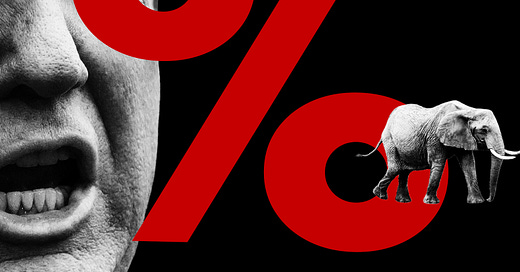
Exclusive Bulwark Poll: Most Republicans Want to Move on from Trump
But more than a quarter of likely voters are ready to follow him to a third party bid.
A large majority of GOP voters is ready to move on from Donald Trump. But a devoted minority might not let them.
That’s the dynamic I’ve watched unfold in my weekly focus groups with two-time Trump voters since the 2022 midterms. Today those findings are reinforced by a new poll by The Bulwark and GOP pollster Whit Ayres of North Star Opinion Research. According to a memo from Ayres:
Donald Trump has slipped to his lowest point since he emerged on the political scene almost eight years ago. He remains a formidable force, to be sure, with a lock on approximately 30 percent of likely Republican primary and caucus voters nationally. But a majority of the GOP is ready to move on.
The Bulwark/North Star Opinion Research poll is consistent with several other polls that have found Trump fading with voters and losing to Florida Governor Ron DeSantis in head-to-head match-ups.
We polled three different scenarios and each showed Trump locked between 28 and 30 percent support from Republican primary voters:
In a head-to-head match, DeSantis leads Trump 52 percent to 30 percent, with 15 percent undecided and 3 percent saying they would not vote if those were the only two options.
With DeSantis, Trump, and “another candidate,” DeSantis got 44 percent, Trump got 28 percent, and the generic “another candidate” got 10 percent, with 17 percent undecided.
In a 10-candidate field, DeSantis got 39 percent, Trump 28 percent, Mike Pence 9 percent, Nikki Haley and Liz Cheney 4 percent each, and five other candidates registered at 1 percent. In this scenario, 13 percent of the respondents were undecided.
There’s a but, though.
Across recent polling (including ours) showing Trump losing ground, he was holding on to anywhere from 28 to 38 percent of GOP voters. So, yes, a strong majority of GOP voters is ready to move on from Trump. On the other hand, here were Trump’s margins in the 2016 early primary states:
Iowa 24.3 percent (Trump came in second)
New Hampshire 35.3 percent (Trump came in first)
South Carolina 32.5 percent (Trump came in first)
Trump then went on to dominate the field in Nevada with 45.9 percent of the vote before catapulting into Super Tuesday with enough momentum to win 7 of the 11 states. And with the GOP’s “winner take all” or “winner take most” delegate apportionment rules, in a big field of candidates, devoted pluralities can be telling.
But surely we’ve learned a few things since 2016?
Presumably the numerous candidates gearing up to run in the GOP primary understand that a fractured field benefits Donald Trump. Are we sure they understand that they’d need to coalesce around a frontrunner by February 2024 to avoid the same scenario that gave us Trump in 2016?
[The Focus Group Podcast with Sarah Longwell returns for a new season on Wednesday. Don’t miss an episode—subscribe here.]
Even more alarming for Republicans is that not all pluralities are created equal. For example, one question I was keen to answer with this poll is how many “Always Trumpers” would follow Trump if he lost the GOP primary and launched an independent bid for president.
And according to our poll, that 28 percent of Republican primary voters already locked in for Trump say they’ll support him even if he ran as an independent in the general election.
Twenty-eight percent!
All of which is consistent with what I’ve been seeing in focus groups.
Since the 2022 midterm elections, I’ve been doing a lot of focus groups with people who voted for Trump in both 2016 and 2020. Very few participants want Trump to run in 2024. “Too much baggage,” is the phrase I hear over and over again. It’s not that they dislike Trump—they simply don’t think he can win. And they’re in the process of shopping around for someone who can. The vast majority of these focus group participants like DeSantis, whom they routinely describe as “Trump without the baggage.”
And you can see all of that borne out in our new poll and the other recent polling.
But then I tried doing some focus groups not with generic Trump 2016/2020 voters, but specifically with voters who view Trump “very favorably.” And in these groups, the reactions were different.
These voters are polite enough about DeSantis, though they often don’t know much about him. But they are ride-or-die for Trump 2024.
This is the Always Trump faction of the Republican party.
And they are why the GOP could be sleepwalking into another Donald Trump catastrophe. Because even though Trump is as weak as he’s ever been, even though he is beset by legal peril, and even though there are alternative candidates turning the heads of a large majority of GOP primary voters (and donors), Trump still has an awful lot going for him:
100 percent name ID.
A devoted base that will follow him on an independent run and potentially split the GOP vote. (And even if Trump doesn’t launch an independent bid, does anyone think he’s going to be a loyal Republican who supports the nominee if it isn’t him?)
A big primary field of candidates who are scared of him and his base and therefore more likely to attack each other than Trump.
New revelations that Biden and Pence also had classified docs at their homes and offices, nullifying Trump’s political (if not legal) vulnerability.
An imminent return to Facebook and Twitter allowing him to fire up his small-dollar fundraising machine and push himself back into the news cycle.
None of that makes Trump a lock to win the nomination. But it’s certainly enough assets to make it possible.
One of the things I always notice about many of the focus group participants who want to move on from Trump is that they still like him just fine. They’re not “breaking” with Trump. Their reasons for moving on have more to do with Trump’s perceived electability.
“People, just across the U.S. and even some Republicans . . . they just look at [Trump] and [are] just disgusted by him for stupid reasons,” one participant from Texas told me.
Another participant put it this way: “I’d like to say flat out that I would vote for [Trump] because I do think that he does what he says he’s gonna do. But at this point, there’s so many people that don’t like him.”
[The Focus Group Podcast with Sarah Longwell returns for a new season on Wednesday. Don’t miss an episode—subscribe here.]
Even interest in DeSantis is usually framed in relation to Trump, which is an indicator of how Trump is still at the center of these voters’ political worldview. When they tell me that DeSantis is “Trump without the baggage” or “Trump not on steroids,” what they mean is that he gives them all the Trumpy stuff they love, but hopefully won’t alienate so many swing voters.
Maybe!
But here’s what I think the Bulwark/North Star Opinion Research’s poll and my focus groups demonstrate about where we are right now:
If you want to argue that the GOP is moving on from Trump, you’re right.
If you want to argue that Trump still has a grip on enough of the base to win a fractured GOP primary, you’re also (probably) right.
And if you want to argue that voters who are interested in moving on from Trump still like Trump and could swing back to him if Ron DeSantis doesn’t fulfill all their hopes and dreams once he’s on the big stage . . . well, I think that’s right, too.
Which is why it’s not enough for Republicans to simply hope Trump fades and another candidate emerges. They have to be proactive about chipping away at the 30 percent of Always Trumpers before it’s too late.
The Bulwark/North Star Opinion Research poll of likely Republican voters was conducted online from January 16 to 21, 2023. Methodology and result summaries. Topline results.











